On this page:
- An international school curriculum
- Teachers and students
- Language instruction
- School philosophy
- Recruitment
- Difficulties
- Achievements
- School history
- Non-public education in Kraków

The philosophy of teaching at EIS is based on the theory of multiple intelligences, developed by Howard Gardner towards the end of the last century. According to this theory, it’s important to develop eight kinds of intelligence in human beings: linguistic, logical-mathematical, musical, spatial, bodily/kinesthetic, interpersonal, intrapersonal, and naturalistic.
Our Kids talks to Katarzyna Kotulska, the principal and co-founder of Embassy International School, an educator with 20 years experience.
An international school curriculum
Our Kids: what’s the difference between a truly international school and a regular school, even a private one?
KK: First of all, an international school is one with an international community. This is the first difference you see right away after you enter our building. We have 30 nationalities in our school—students, parents, and teachers.
But most of all, the international character of our school means implementing a different curriculum. We have an international curriculum based on the British national curriculum. This is used for kids in elementary school all the way up to high school, where students finish with an international diploma. All these curricula, of course, differ in the way they’re implemented.
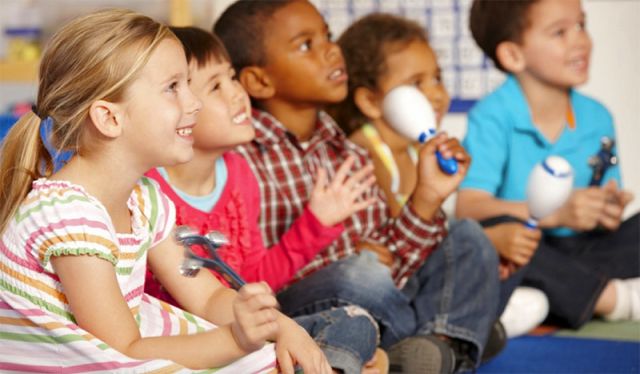
Something that I’m always trying to explain to many parents who don’t know the specific context in Poland is that in some countries the national language is imposed, so all the children getting education in that country are taught in the country’s language. Poland is not like that, and thus in our school all children go through the British curriculum, which is an international program. But Polish kids, on top of this, have to go through the Polish national curriculum. So our Polish kids have a lot of work, and it’s a big challenge to them.
Our Kids: Is the Polish national curriculum used from the very beginning or is it introduced later?
KK: No, not from the beginning. It’s implemented in Grade 0 (zerówka), because this is when education officially becomes compulsory, and this is when we start preparing our Polish children to speak, read, and write proper Polish. The Polish national curriculum ends at the same time as compulsory education—the end of elementary school.
This year, for the last time, we still had the last grade of middle school, but middle schools will no longer exist after this school year. From now on, the obligation to implement the Polish national curriculum will end after students finish Grade 8. Then Polish students take exams, and after that, their studies are based on the British national curriculum.
Our Kids: So high school is based exclusively on the British national curriculum?
KK: Yes. If children want to continue education in the Polish language, which is often the case, because this is what their parents may wish, we offer general culture classes where they learn about important Polish literature, arts, film, and theater, so that they become well-rounded, educated individuals.
Our Kids: But they do not take the Polish matura exams?
KK: No, they earn the British diploma. At our primary level, we use the British curriculum, but we implement it through the International Primary Curriculum (IPC), whose idea is very close to the IB program at the PYP (Primary Years Programme) level, which involves project-based teaching. We do have the British curriculum as our basis, but we decided that IPC is a great way for the students to acquire knowledge and engage in experiential learning. This refers to all the subjects except English and math, which are taught strictly according to the British national curriculum.
This is the situation until Year 6. Then our curriculum is taught in the exact same way as in Britain, with one exception. We have decided to expand the British program in science by 100%, so that our students have more material in biology, physics, and chemistry. It’s as if combining the British approach with the Polish one.
Theory is always useful and necessary, but at the same time, the kids are happy and love what they do when experimenting and doing research. I think that we’ve achieved a great mix. Later, we have two years of preparations for GCSE and then the GCSE exam, and after that, our A-level diploma program and exams.
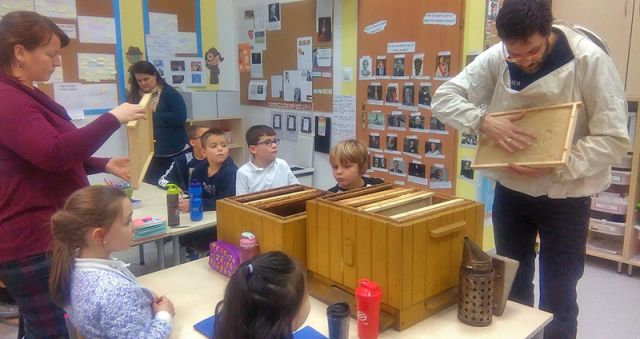
Our Kids: Is the diploma the students get at the end—the British diploma—treated by Polish universities as the British equivalent to the Polish matura?
KK: Oh yes, it’s respected by all universities, both in Poland and all around the world.
Teachers and students
Our Kids: Who teaches in your school? I noticed that over 60% of your teachers have 10+ years of experience in education, so it looks like they’re very experienced educators.
KK: We have excellent teachers who are a very diverse group. We are very careful in choosing them, and once they are on board, we work with them extensively, and they also put a lot of effort into their work. They’re mostly teachers from Poland, because we need Polish teachers to implement the Polish national curriculum, but there are also people of Polish origin who spent many years abroad and returned to Poland, to their roots.
Sometimes we also have teachers who are foreigners coming to Poland, because their spouses are Polish and they’re looking for a job. They come from many countries, including Great Britain, Ireland, South Africa, Malta, Canada, and Australia. It happens that Poland is just one stop on their professional map, but sometimes they stay in Poland for good.
Our Kids: What about your students?
KK: 40% of our students are Poles. At the moment, there’s great interest in our school, and generally in non-public education. Parents realize that an international school gives their kids great opportunities and “a window into the world.”
Many people realize that the system of public education in Poland is in great chaos. Some parents are mostly interested in their kids learning another language well, and they don’t seem to realize that our school isn’t just about learning languages, but it’s extremely challenging and demanding in teaching other subjects.
The rest of our students are from various countries, many of whom are Ukrainians and Russians. We have many kids from mixed marriages or families that came back to Poland from somewhere else, for example, from Great Britain, Switzerland, or the Netherlands. These parents don’t want to send their kids to a public school—they want them to continue their international education.
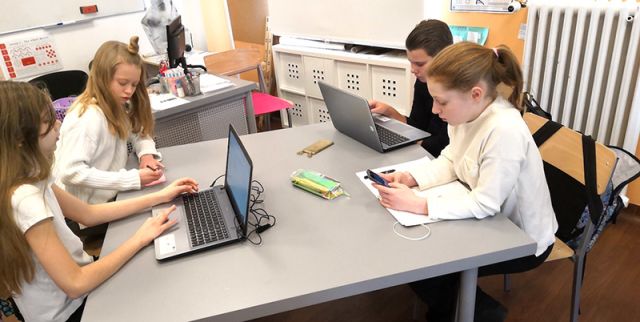
Language instruction
Our Kids: In the description of your school, we read that you provide extra classes in native languages of your students, and not only such common ones as French or German, but also Hungarian or Korean. How do you manage to organize this?
KK: The international community in Kraków is very large because it’s an academic city. When a family comes, for example, from Hungary, we try to find a teacher of that language for them. Sometimes there are no such teachers—that was the case with Korean, Chinese, and Japanese (interestingly, our biggest problem was finding someone to teach German, even though Poland is Germany’s neighbouring country). So we always look into universities. Jagiellonian University has a large modern language department which invites native speakers, so we work with them. It’s not always easy, because we’re only interested in native speakers who are also teachers, and not every native speaker of a language can teach that language.
Our Kids: It’s really interesting that you also have language courses for parents.
KK: Oh yes, people come to Poland, and they want to learn some Polish. We concentrate on very practical language skills and communication, so that they can communicate in a store or at a market. We don’t teach grammar or writing. Once a week parents come for one and a half hours, so that right after their language class, they can pick up their children from school. But the parents also want to learn some English, so we help them with that as well. It’s because our international school is a close-knit community. For them, it’s a world in itself, and for many parents and families, it’s like the center of their life. We help them in many ways, e.g., to find a doctor or somebody who can fix something in their apartment or house.
School philosophy
Our Kids: Your school relies on the philosophy of multiple intelligences, developed by Howard Gardner. What does that mean in practice, in everyday school life?
KK: Above all, it means that we believe that each student is different. In the case of an international school, those differences are even more obvious, because children come from many countries with different educational systems and cultures, they have different experiences and talents. There are kids who may not be that gifted academically, but they have incredible artistic talents. This is very important information for us as a way to reach such children to reduce their stress levels and to increase their self-worth. A lot can be built based on a good self-image. Not every child has to be perfect at everything.
Of course, school teaching is not everything. We have a lot of extracurricular activities—all kinds of clubs and interest groups. Some of them are obvious, like sports, arts, or science clubs, but we also have some you won’t find anywhere else, for example, our TedEx club. We’re the only school in the region granted licence to organize TedEx Youth events. First we had licence for one such event, and this year there were three. All that is done exclusively by the students themselves, and that’s a major difference between us and others: our students are extremely involved in our school and its life.
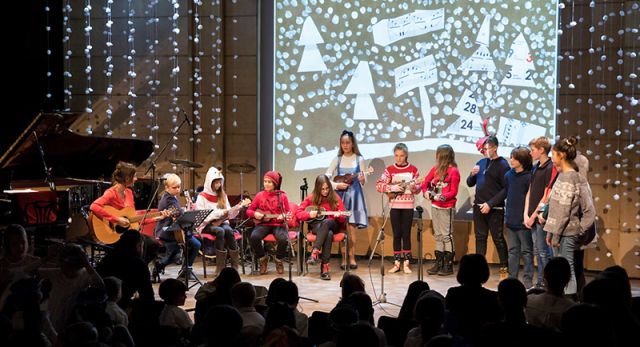
Recruitment
Our Kids: How does your recruitment system work, and when do parents need to make sure that their child gets into your school?
KK: Our recruitment process is ongoing. This is a unique feature of international schools, because parents come with their children at different times during the school year.
It often happens that parents are the only ones that talk to us, because they come earlier to get everything arranged. But if they have their child with them, we also talk with the children. We also take into account school reports from previous years.
Our Kids: So you don’t have entrance exams?
KK: If it’s an older child who joins our school at the diploma level, we have to verify that he or she will cope. If we conclude that there would be a problem, we suggest moving them down a little bit. There’s no point in having a child in class who won’t be able to cope. We’re very open and frank communicating with the parents. But we don’t avoid the problem, so children who have issues always get a lot of support from us.
Our Kids: What kind of support?
KK: Mostly it’s individual work with the students in the area in which they need most help.
Difficulties
Our Kids: Do you encounter any problems?
KK: I think the problem is that we care so much. We have children at various ages. Sometimes, as everywhere, there are problems and conflicts, but we pay very close attention to make sure we notice them and react to them. That’s why we have two psychologists who work with the children. but also with the teachers. All kinds of issues, both academic and non-academic, are important to us, and the effects of this attitude are visible because our children form a wonderful community.
Achievements
Our Kids: What are you most proud of?
KK: I’m proud of my fantastic children who love coming to school and love studying, which was not the case before they came here. I see how they get involved and how engaged their teachers are. They refer to them as “our kids”—this is how they talk about them and treat them. They devote a lot of time to them: sometimes they come to school even on their day off, because that was the arrangement with the students.
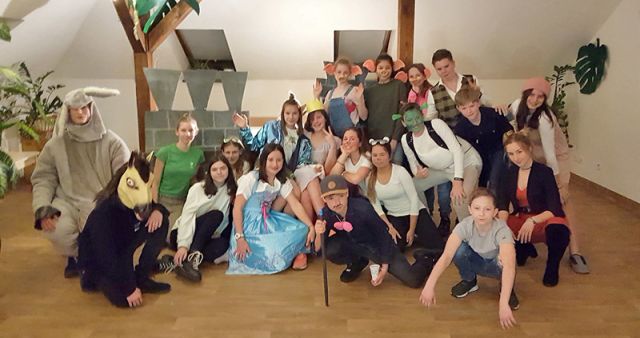
School history
Our Kids: How did it happen that you created this school?
KK: There are two of us—myself and Lindsay Davidson. We are principals like a dragon with two heads. I have 20 years of experience working in education, mostly in higher education. I worked at the Economic University and at private universities. I completed my PhD in economic management, and teaching has always been of great interest to me. I got married and had two children. I found out that there was an international school in Kraków, and right away I decided that that was the right education path for my children.
When I was in high school, I had won a Ronald Reagan scholarship, and went to the United States to study. That year in an American high school was incredible, and helped me develop very much, so I was sure that this was the route for my children. At that time, I was a very active mother and I wanted to change a lot. This is where I met my present business partner, Lindsay Davidson, who was the principal at that school. After some time, I wasn’t fully satisfied with the school, so I withdrew my daughter. Lindsay did the same, and our daughters went to a Polish private school. But that was not the best choice either.
Many people started pushing me to organize homeschooling, but I didn’t think this was the best solution, and I decided it was a good time to open a full-fledged, high-quality international school in Kraków. My first phone call was to Lindsay, who said that he had been thinking about the same for a few years.
It took a long time, however. For 2 ½ years we were looking for a building that would satisfy our requirements—being in the city centre, fenced in, and safe. At the same time, we worked on creating the concept of our school. We started hiring teachers even before our walls had been painted, and they wanted to work with us, believed in our ideas, and had a lot of passion. Most of them are still with us today. The first year we had only 53 students, and this coming year there will be 200.
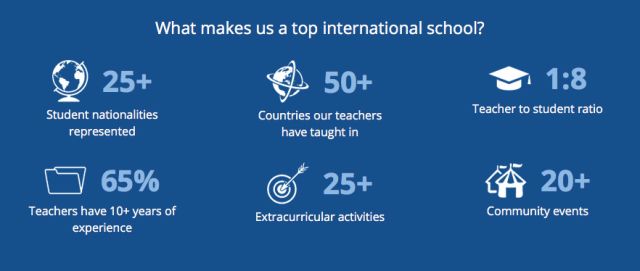
Non-public education in Kraków
Our Kids: What’s the non-public education landscape like in Kraków?
KK: There are many private schools in our city, but few real international schools that have native speakers and implement non-Polish curricula. There are only three of those. Some schools collectively implement the IB programme, but only in the last two grades, so to teach biology or chemistry they have to rely on external teachers, because they can’t afford to hire teachers full-time.
Many new schools that keep appearing call themselves international but they’re not international schools per se. I think generally this is a good option for people who can’t afford educating their children in a truly international school. Those are more like bilingual schools, or schools that have a lot of English, which is also good, but they can’t truly be called international schools.
People who read this also viewed:
- Warsaw private schools
- Kraków private schools
- Poznań private schools
- Wrocław private schools
- Łódź private schools
- Rzeszów private schools
- Gdańsk & Gdynia private schools
-
Advice Guide
- ABC of educational terminology: Glossary of terms and concepts
- The admissions process
- Advantages and disadvantages of studying in an international school
- The application process
- Benefits of Polish private schools
- Bilingual schools
- Boarding schools
- Choosing a private or nonpublic school in Poland
- Compare schools in Poland
- English schools in Warsaw
- Homeschooling
- International schools in Kraków
- International schools
- Private school interviews
- Music education
- Myths about private education
- Non-public schools in Poland
- School open houses
- Our Kids Interview: Get to know EF Academy Oxford
- Our Kids Interview: Get to know Open School
- Our Kids interview: Get to know Regent College International Schools
- Our Kids Interview: Get to know The American School of Warsaw
- Our Kids Interview: Get to know The British School Warsaw
- Our Kids Interview: Get to know Wrocław Cosmopolitan School (two interviews, new video)
- Poland school profiles
- Private day schools
- Gifted schools & programs
- Private Jewish schools in Poland
- Language schools
- Private school tuition and costs in Poland
- Private schools in Poland
- Private schools in Poland offering French-language immersion
- English immersion schools
- Poland school uniforms
- Private special needs schools in Warsaw
- Public versus non-public schools in Poland
- Private school questions
- Private school rankings
- Reasons for choosing private schools - Our Kids’s survey report
- Religious schools
- Schools and classes for children with ADHD in Poland
- Social primary schools
- Social Schools
- Special educational needs (SPE) certificates
- Special needs schools
- Study abroad at a private school
- The first annual non-public school fair in Poland
- The first annual Our Kids non-public school expo in Warsaw was a great success
- Third Private School Expo in Warsaw - summary
- Types of schools
- Types of schools in Warsaw
- Warsaw preschool costs
- Why private school?
- Why parents go private
-
Grades
- Boarding high schools
- Choosing a high school in Poland
- Mokotow High School Campus - a new Warsaw high school and Thames British School campus
- Montessori nursery schools
- Montessori preschools
- Our Kids Interview: Get to know English Montessori School Katowice
- Our Kids Interview: Get to know FSA School
- Our Kids Interview: Get to know KIDS & Co.
- Our Kids Interview: Get to know Polish British Academy of Warsaw
- Our Kids Interview: Get to know The English Playhouse and The English Primary
- Poland education: grade levels
- Preschools in Warsaw
- Private & non-public preschools
- Private & non-public primary schools
- Private bilingual elementary schools in Warsaw
- Private high schools
- Private high schools in Warsaw
- Private middle schools
- Nursery schools
- Private primary schools in Warsaw
- Social high schools
-
Locations
- Boarding schools in Warsaw
- English schools in Kraków
- International Baccalaureate (IB) schools in Warsaw
- International schools in Warsaw
- Montessori schools in Warsaw
- Non-public schools in Warsaw
- Our Kids Interview: Get to know EF Academy
- Our Kids interview: Get to know Excellence in Education better
- Our Kids Interview: Get to know PRIMUS Non-Public Primary School No. 47 and Non-Public Secondary School
- Our Kids Interview: Get to know the Canadian School of Warsaw
- Our Kids Interview: Get to know The Primary and Secondary Schools of the Sisters of Nazareth in Warsaw
- Private Catholic and Christian schools in Warsaw
- Private day schools in Warsaw
- Private language schools in Warsaw
- Private schools in Bialystok
- Bydgoszcz schools
- Częstochowa schools
- Private schools in Gdańsk & Gdynia
- Katowice schools
- Private schools in Krakow
- Lublin schools
- Olsztyn schools
- Private schools in Poznań
- Private schools in Rzeszów
- Szczecin schools
- Private schools Warsaw
- Private schools in Wrocław
- Zielona Góra schools
- Private schools in Łódź






 POL
POL CAN
CAN